Best No-Sugar Foods Grocery List (No Added Sugars)
If you are trying to cut back or eliminate added sugars from your diet, then you’ll love this Sugar Free Foods Shopping List. Find foods from every category including fruits, vegetables, grains, proteins, and healthy fats that have no added sugars.
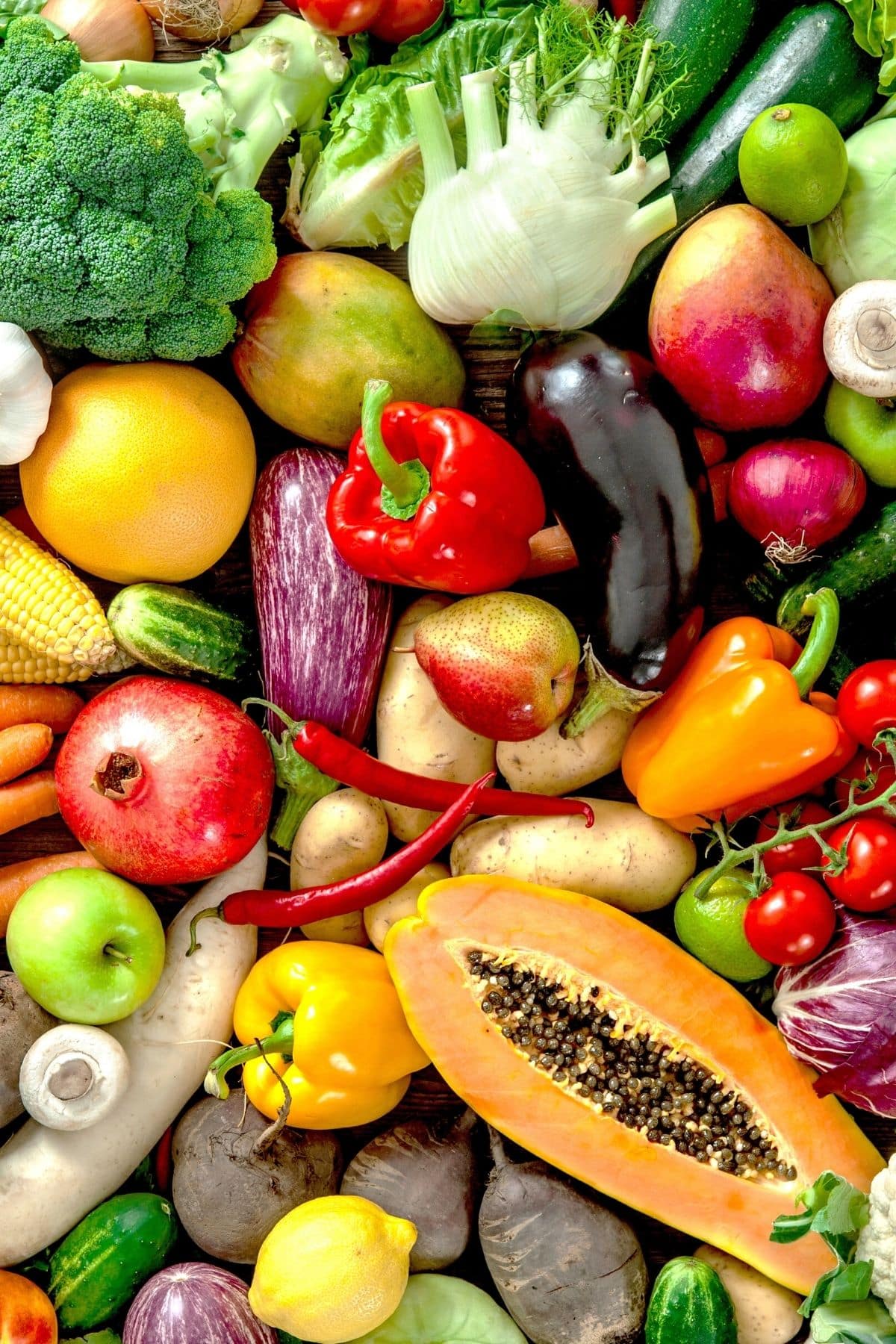
Sugar Intake
The average American consumes about 17 teaspoons of added sugars per day.
That is way over the current recommendation by the American Heart Association to limit added sugars to about 6 teaspoons for women and 9 teaspoons for men per day.
One of the problems with added sugars is that they can now be found in almost every processed or packaged food. Sugar is found in everything from baked desserts to peanut butter, ketchup, beverages, coffee creamers, soups, cereals, breads, crackers, and more.
These added sugars are likely the culprit of many of our symptoms and ailments, including heart disease, inflammation, unstable blood sugar levels, insulin resistance, low energy levels, weight gain, and fatigue.
How Sugar Much is Okay?
Ideally, we would consume less than 5-10% of our daily calories from added sugars.
So, if a woman needs around 2,000 calories per day (depending on activity levels and several factors), that means that fewer than 100-200 calories should come from added sugars per day.
Just for reference, a 12-ounce soda contains about 11 teaspoons of sugar, which is already over the limit for the recommended daily maximum of added sugar for both men and women.
Added sugars like the ones found in processed and packaged foods are much more concerning to our health that natural sugars found in fruits and vegetables. For most people, natural sugars from whole fruits are healthy because they usually also contain fiber and antioxidants.
Remember: fruits do not contain added sugars, whole fruits contain natural sugars along with fiber and antioxidants. Added sugars like high-fructose corn syrup are not naturally-occurring sugars.
Also, some people may need to eliminate all added sugars, plus even natural sugars. People who have diabetes or pre-diabetes need to be cautious and have the nutritional guidance of a licensed healthcare provider regarding their sugar consumption.
Learn more about natural sugars vs. added sugars.
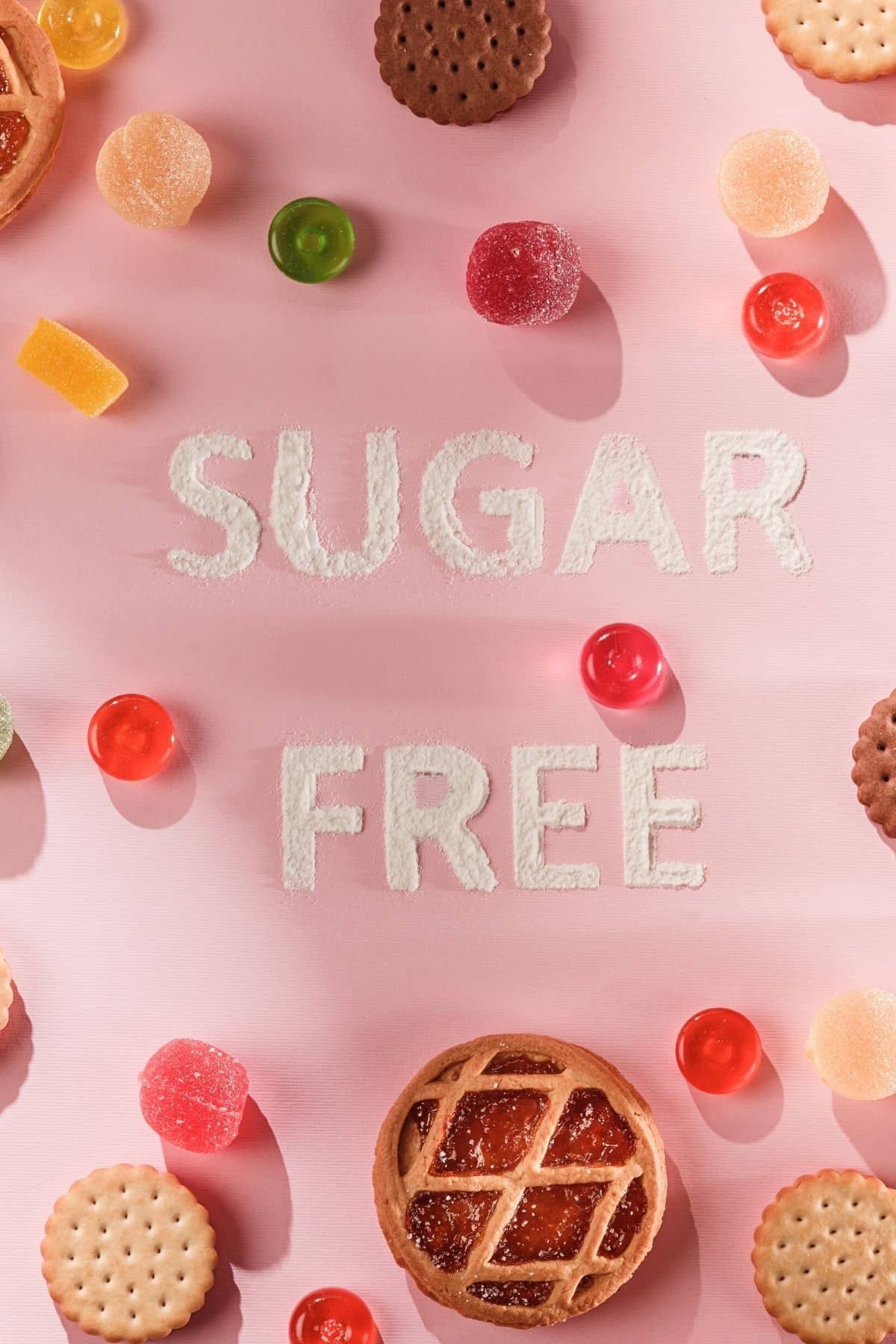
Best No-Sugar Foods
If you want to cut back on your added sugars, then check out this list of the best sugar-free foods. Add these to your next shopping list so you can stock your kitchen full of these healthy whole foods.
Discover a wide range of nutritious low sugar foods that can enhance your health. Incorporate these naturally low-sugar options into your diet: vegetables, low-sugar fruits, proteins, legumes, whole grains, nuts and seeds that provide essential vitamins and minerals.
Opt for unprocessed and unpackaged foods to maintain a balanced diet while minimizing sugar intake.
1. Fruits
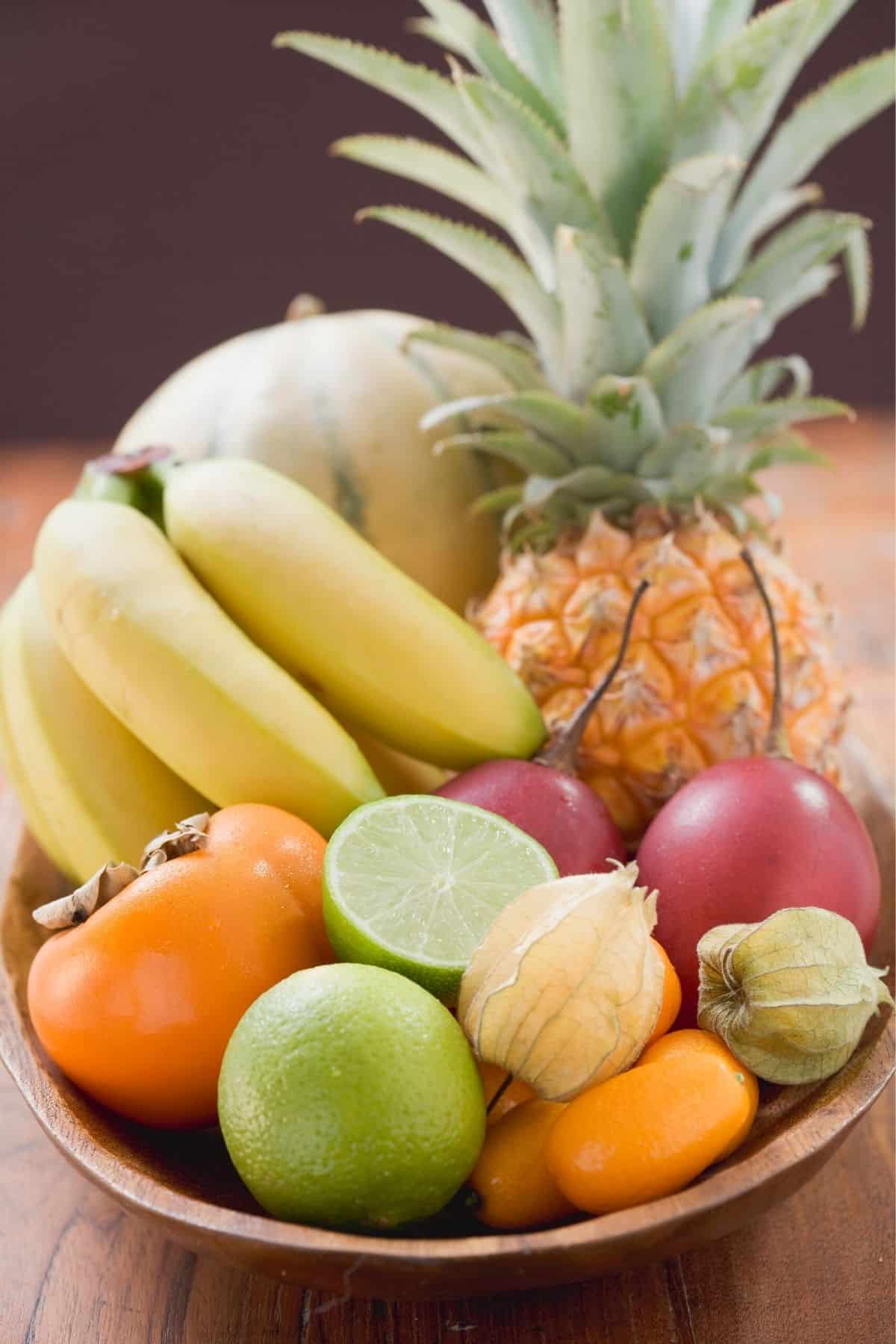
Fresh fruits like berries and green apples will have the lowest natural sugars. Tropical fruits and dried fruits have the highest levels of natural sugars.
But, there are no added sugars in any fresh fruits (fruit juice may have added sugars).
- Apples
- Apricots
- Avocados
- Bananas
- Blackberries
- Blueberries
- Cherries
- Grapefruit
- Grapes
- Green Apples
- Kiwi
- Lemon
- Lime
- Mango
- Melons
- Nectarines
- Oranges
- Papaya
- Peaches
- Pears
- Persimmons
- Pineapples
- Pitted prunes
- Plums
- Pomegranates
- Raspberries
- Strawberries
- Tangerines
- Watermelon
2. Vegetables
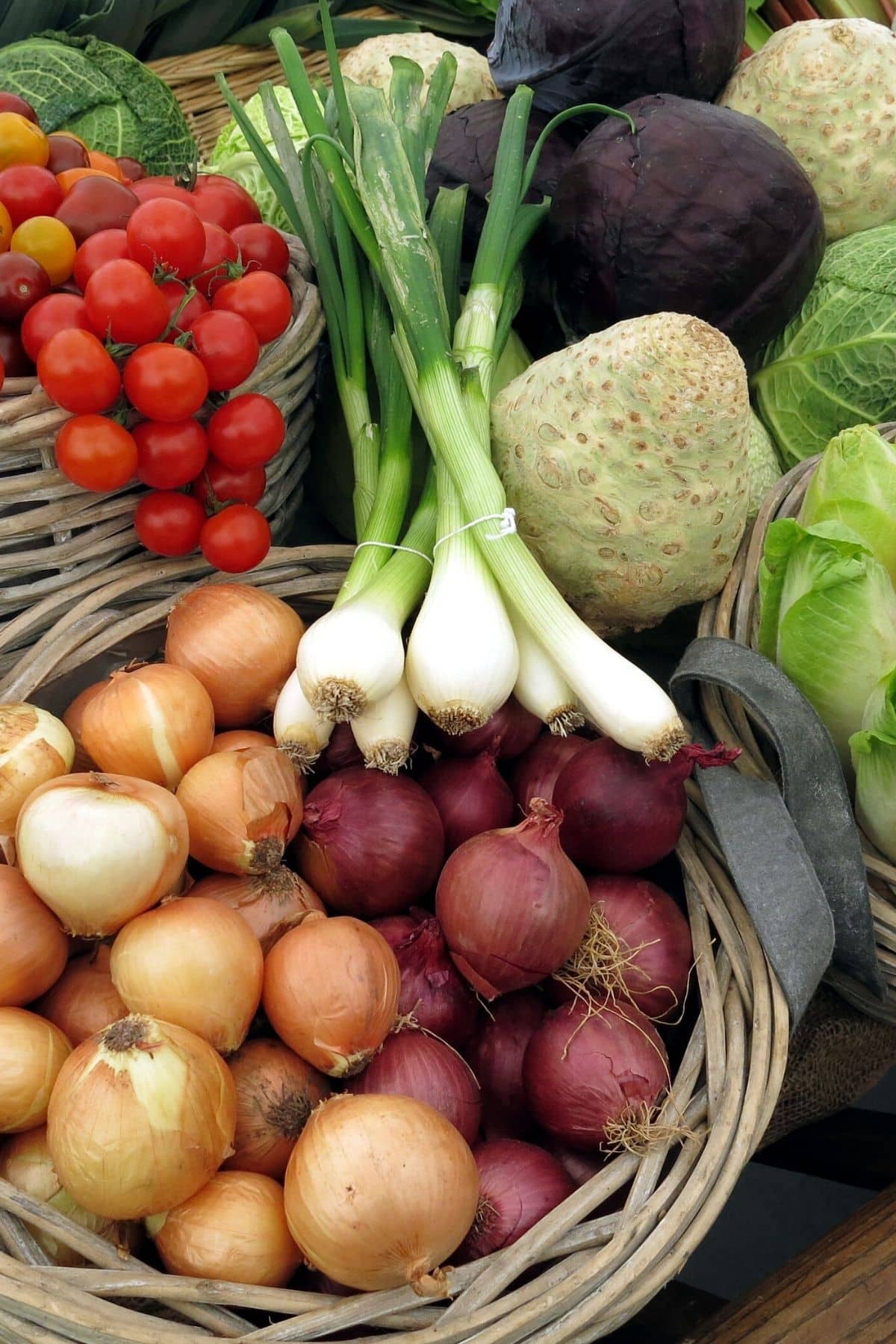
Vegetables of all types are low in total sugars. Some starchy vegetables like white potatoes, sweet potatoes, and carrots are higher in natural sugars. All vegetables are part of a sugar-free diet.
If you purchase any canned vegetables, read the labels to make sure there are no added sugars.
You may also wish to check out my picky eater food list if you are worried about the taste of veggies.
- Artichokes
- Arugula
- Asparagus
- Broccoli
- Brussel sprouts
- Butternut squash
- Cabbage
- Carrots
- Cauliflower
- Cucumbers
- Fennel
- Garlic
- Ginger
- Green beans
- Kale
- Mushrooms
- Okra
- Onions
- Peas
- Peppers
- Pumpkin
- Radishes
- Romaine lettuce
- Spaghetti squash
- Spinach
- Sweet Potatoes
- Tomatoes
- Yams
- Zucchini
3. Beans, Peas, and Legumes
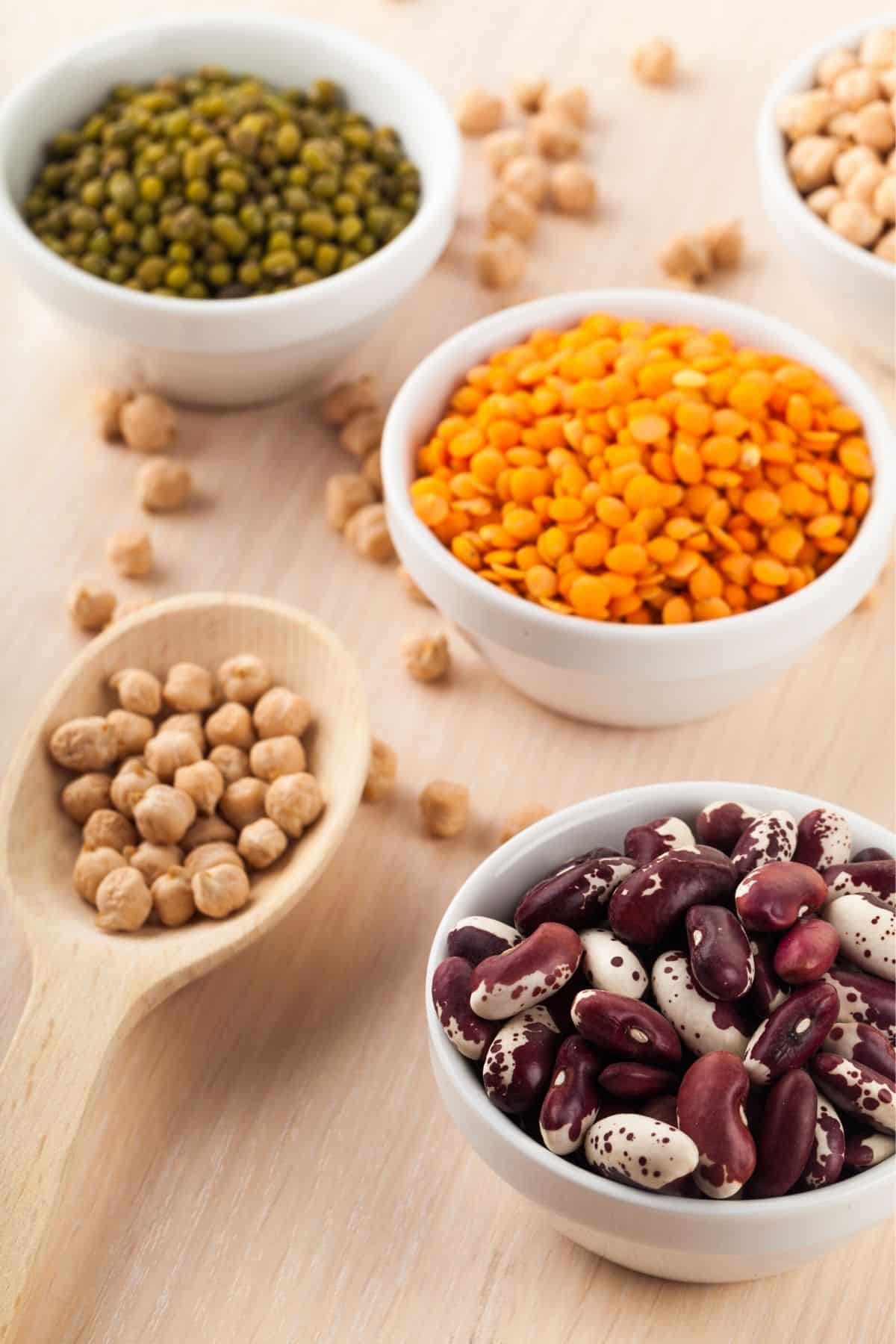
While beans, peas, and legumes are high in carbohydrates, they are low in natural sugars and have no added sugars.
Be sure to read the labels on any canned cooked beans to make sure there are no added sugars (such as in baked beans).
- Adzuki beans
- Black beans
- Black-eyed peas
- Cannellini beans
- Edamame
- Garbanzo beans
- Great northern beans
- Kidney beans
- Lentils
- Mung beans
- Navy beans
- Peas
- Peanuts
- Pinto beans
- Red beans
4. Animal & Plant Proteins
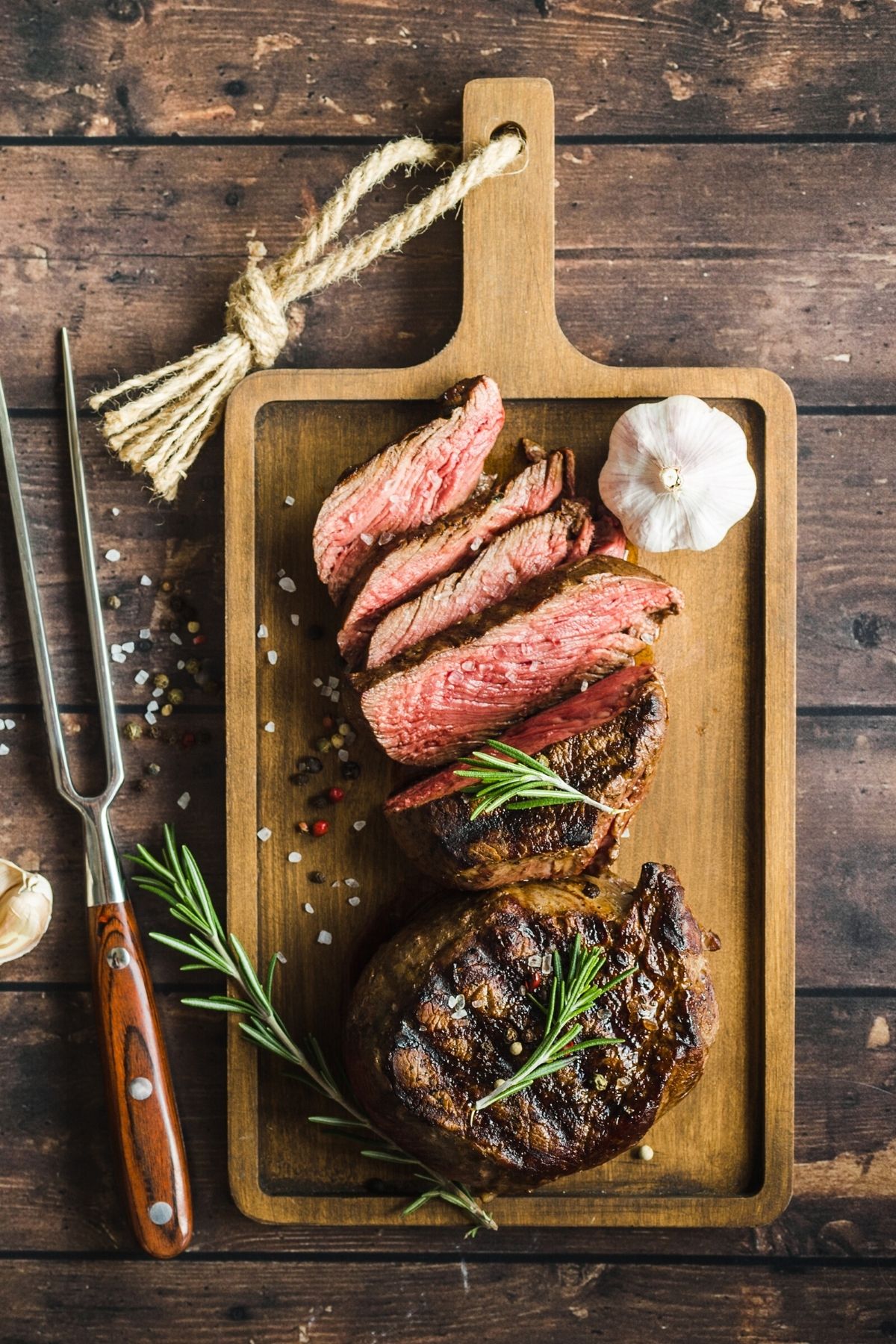
Cooked proteins can be very satiating and can help with reducing sugar cravings (see all of my tips for a sugar-free diet).
- Beef
- Bison
- Chicken
- Eggs
- Fish and shellfish
- Game meats
- Pork products including bacon (look for sugar-free versions)
- Soy products including tofu and tempeh
- Turkey
5. Dairy Products & Dairy-Free Milks
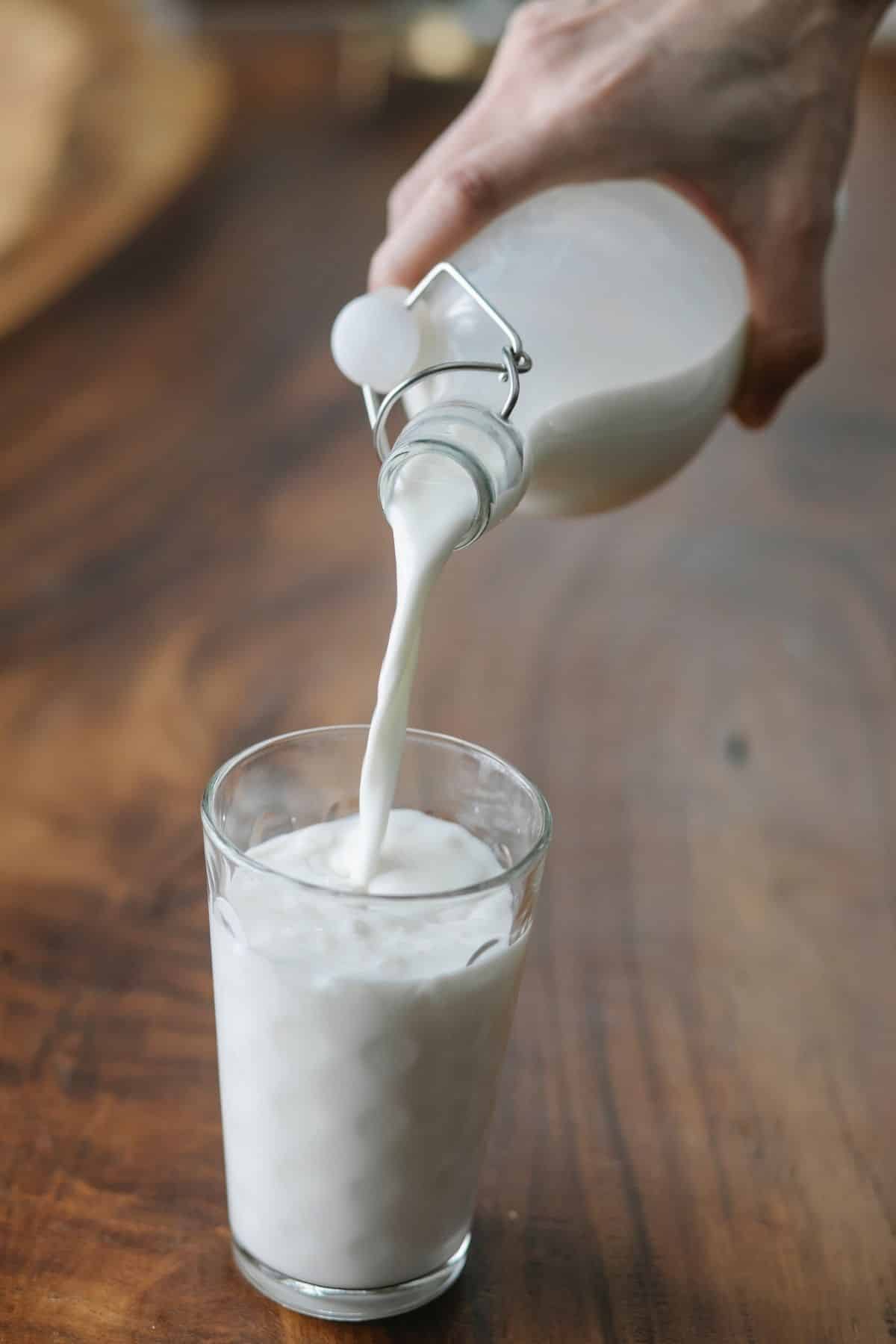
Dairy products do have natural sugars, but they are also high in protein.
Products like flavored yogurts often have a lot of added sugars in them. But, plain, unsweetened dairy and plant-based milk products have no added sugars.
Here are some dairy and dairy-free milk options to consider (be sure to read the labels on any food packages to make sure you are getting options without any added sugars).
- Almond milk
- Coconut milk and coconut beverage
- Dairy milk (if tolerated)
- Hemp milk
- Kefir
- Milk
- Rice milk
- Soy milk
- Yogurt
If you need a coffee creamer, check out my list of the best sugar-free creamers.
6. Grains
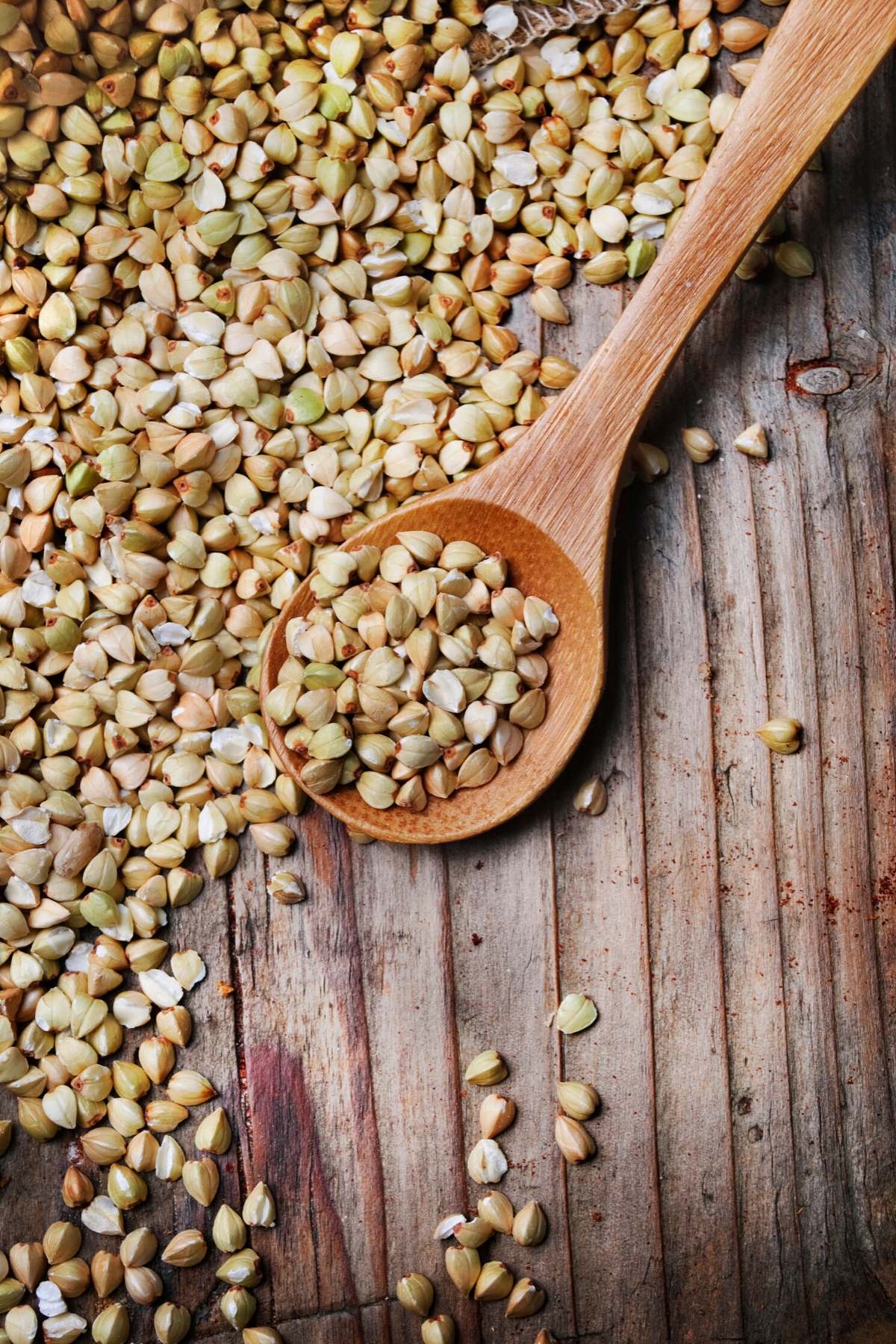
Whole grains and grain products like pasta generally do not have added sugars, unless you are purchasing items like packaged oatmeals and cereals sweetened with table sugar.
Avoid refined grains like white bread, crackers, and cookies.
Here are some whole grains that you can purchase in their whole form and cook at home. Serve them alongside a source of protein and healthy fat for a balanced meal.
- Amaranth
- Buckwheat
- Corn
- Millet
- Oats
- Quinoa
- Rice
- Sorghum
- Teff
- Wild rice
- Barley
- Rye
- Wheat berries
- Spelt
7. Nuts & Seeds
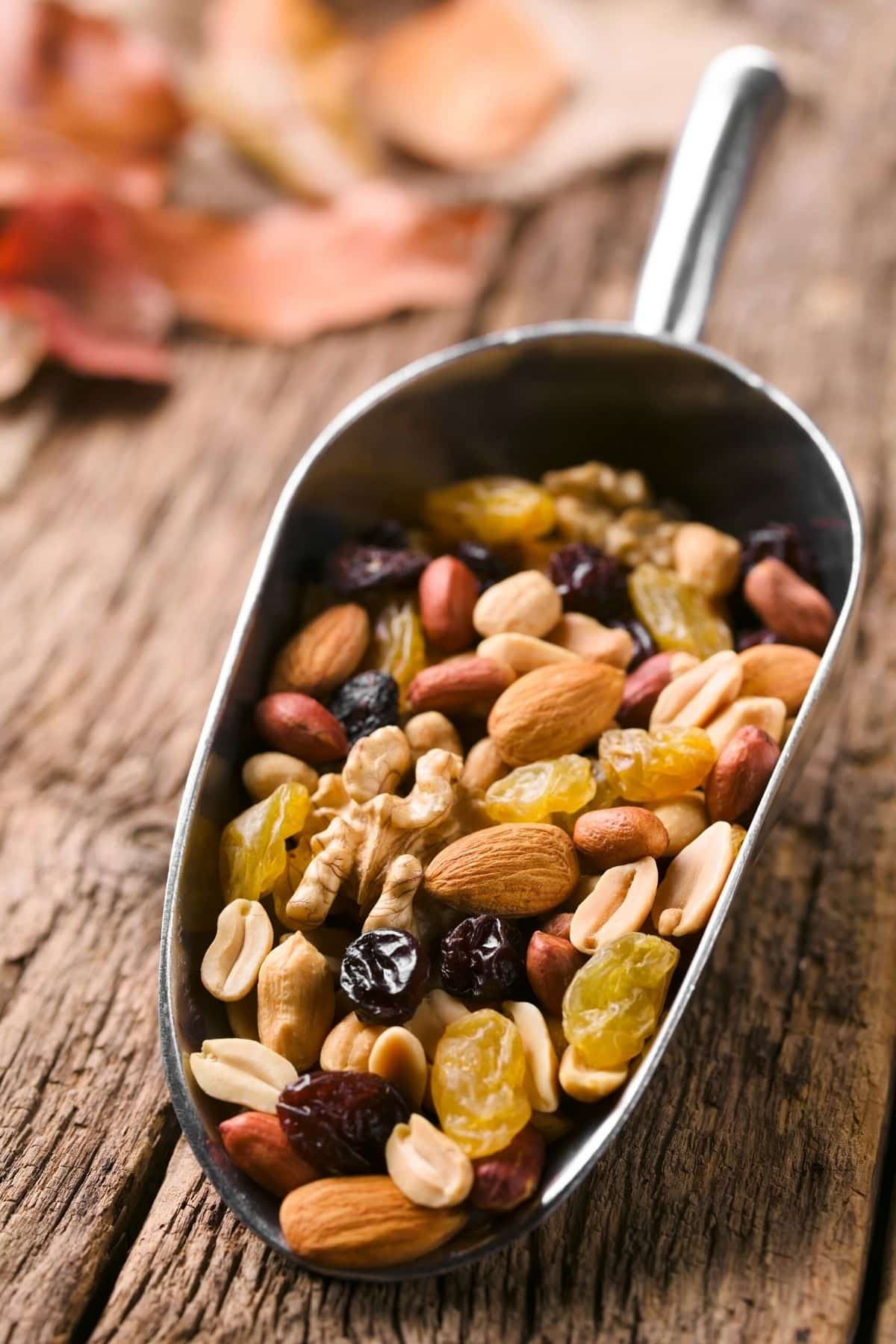
Nuts and seeds have a nice balance of healthy fats and protein, so they make a great snack or addition to a meal.
Look for roasted and salted versions for the most flavor. Avoid trail mixes which often have candies in them.
I like adding nut butters as one of my healthy weight loss ingredients for smoothies too.
- Almonds
- Brazil Nuts
- Cashews
- Chia seeds
- Flax seeds
- Hazelnuts
- Hemp seeds
- Macadamia nuts
- Pecans
- Pistachios
- Pumpkin seeds
- Sunflower seeds
- Walnuts
Bonus: Sugar-Free Snack Foods
While I hope the list of sugar-free foods above will help you with your shopping, I can understand that we need easy snacks on hand when times get busy.
If you want to buy prepared sugar-free snacks, you can check out my list of the best gluten-free and dairy-free snacks. From hummus with veggies to ants on a log, this list includes over 60 healthy snacks ideas.
For specific sugar-free snack brand recommendations, you can refer to the list of Whole30 approved partners or check on my Amazon storefront for clean eating snacks.
Other general sugar-free snacks foods include:
- Hummus,
- Nut butters (read the label to make sure there are no sugars added),
- Plain yogurt with berries,
- Whole fruit like a sliced apple,
- Dried fruits with no added sugar,
- Cheese,
- Plain coffee or tea,
- Handful of nuts,
- Homemade smoothies using a paleo protein powder with no sugar,
- Sparkling water flavored with real fruit juice,
- Plain rice cakes.
Sugar-Free Food FAQs
Just eat real foods! Seriously, you can eat so many foods on a sugar free diet, including fruits, vegetables, whole grains, animal protein, plant protein, eggs, dairy, nuts, seeds, avocados. Homemade foods will almost always have less sugar than packaged foods. So, to make healthier choices, try cooking most or all of your meals at home.
See the list above for ideas or check my clean eating recipe index for meal ideas.
There’s a lot of low sugar foods. In general, low sugar foods are those high in protein, fat, or fiber and low in natural or added sugars.
Animal proteins including beef, poultry, and seafood are high in protein and contain no carbohydrates or sugar. Foods like spinach, arugula, squashes, cruciferous veggies, and other non-starchy vegetables are low in carbohydrates and sugar and high in fiber.
Fruits like berries and starchy vegetables like sweet potatoes and plantains are higher in natural sugars and carbohydrates, but are still included in low sugar diets in moderation. Higher-glycemic fruits such as pineapple, grapes, bananas, and melons can also be included on a low-sugar diet in moderation.
If you have pre-diabetes or diabetes (or any other metabolic condition), be sure to check with your healthcare provider to determine exactly which foods are good for you.
As long as you don’t have diabetes or pre-diabetes, you should be able to consume several servings of fruit per day. If you feel like eating fruit triggers your sugar cravings, then opt for fruits that are lower in natural sugars such as berries or green apples.
You have to read the ingredient labels of any processed or packaged foods to know if sugar is in the food. Natural sugars will not be listed as an ingredient, but added sugars will be there. Also, be aware of artificial sweeteners which will be listed by different names on food labels.
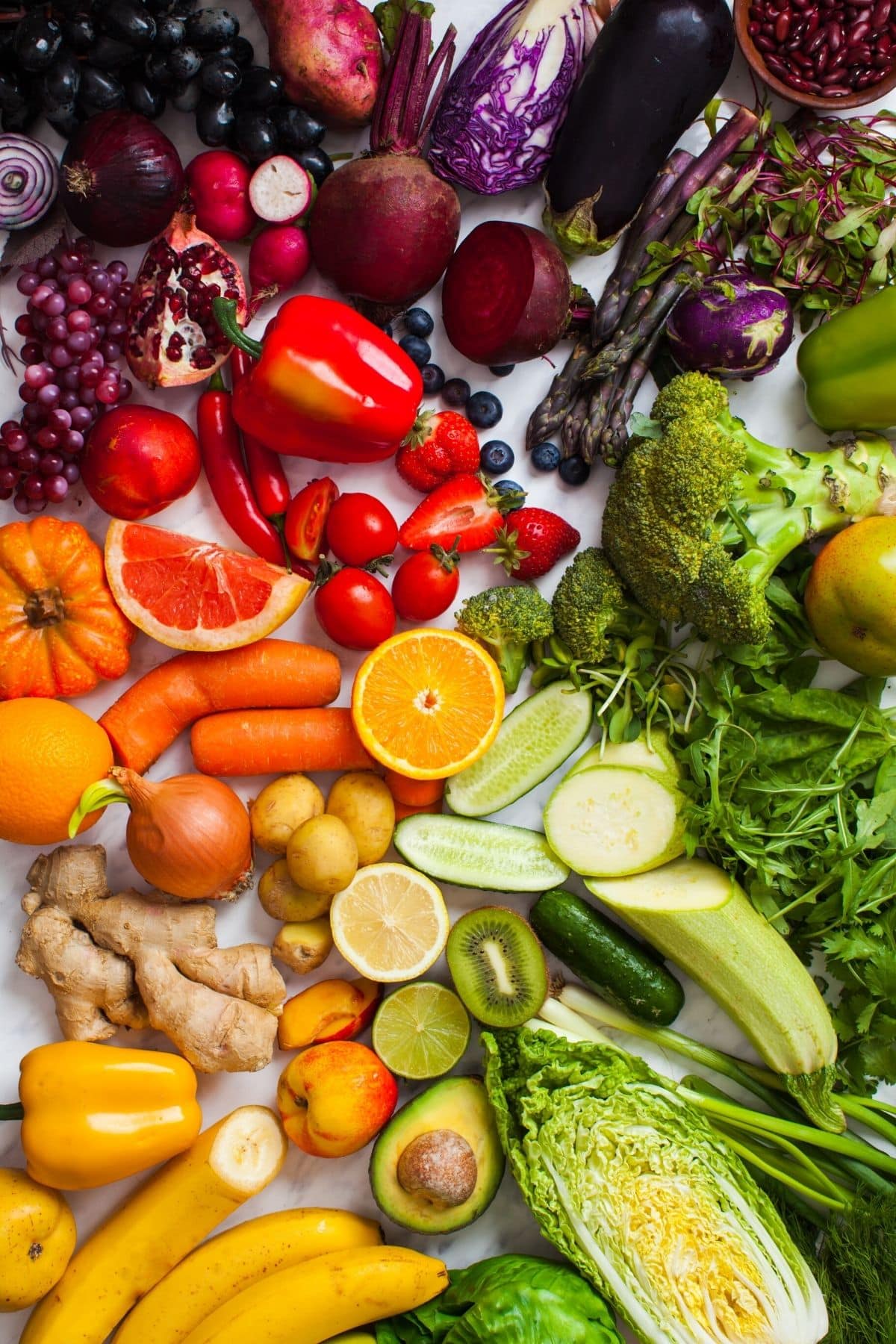
More Sugar-Free Resources Including Free Download
Clean Eating Kitchen has many resources for people who want to go sugar-free or want to avoid eating too much sugar.
Check out this article about how to beat sugar cravings. You may also want to see my articles with a sugar-free diet plan and the health benefits of going sugar-free.
I’ve also made a list of the best sugar substitutes if you need some help getting through the cravings.
Lastly, I’ve created a free downloadable PDF of this sugar-free shopping list. The document is printable and is my gift to you!
Consider joining my Sugar-Free VIP mailing list for more exclusive tips and recipes.
Don’t Miss These Helpful Sugar-Free Articles
Conclusions
You don’t have to feel deprived on a sugar-free diet! Use this list of no sugar foods as your shopping list so you always have something to eat. Choose from a variety of real, unprocessed foods for optimal health.
Don’t forget to join my newsletter list to get exclusive clean eating recipes and tips. The newsletter is 100% free with no spam; unsubscribe anytime.
About the Author: Carrie Forrest has a master’s degree in public health with a specialty in nutrition. She is a top wellness and food blogger with over 5 million annual visitors to her site. Carrie has an incredible story of recovery from chronic illness and is passionate about helping other women transform their health. Send Carrie a message through her contact form.
Note: this post is for informational purposes only and is not intended as medical advice. Please consult your healthcare provider for recommendations related to your individual situation.


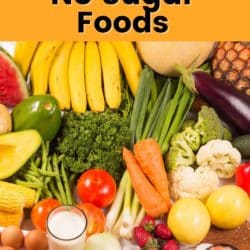
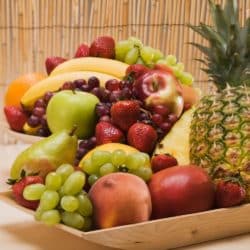
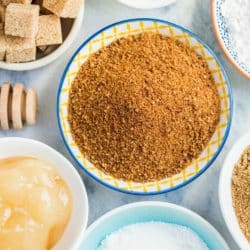

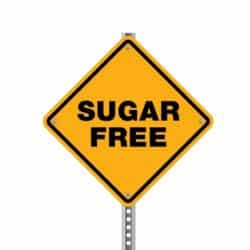


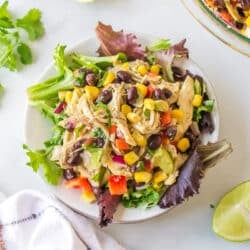
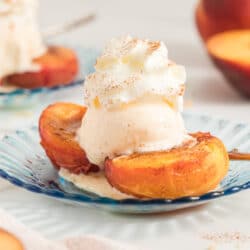
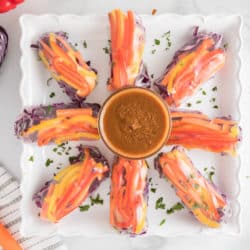
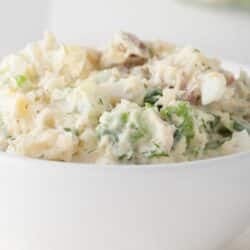
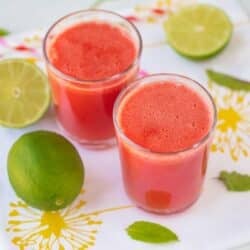
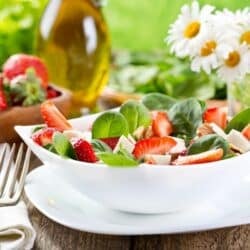

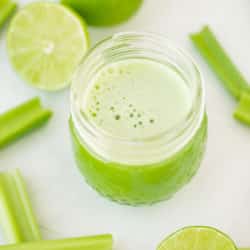


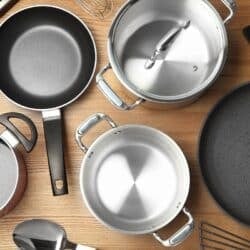
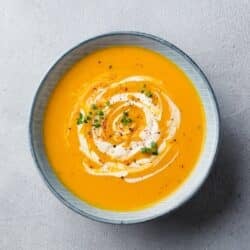


Hello being that I have Carpal Tunnel in both wrists it’s painful to write down these food lists. Is there any way to print them instead.
Thanks, Irene
hi could you please post drink options with no added sugar pleeease its so important to me
Great question! Your best bet is water or any bottled drink with no added sugars. Sparkling waters with natural fruit flavors and no sugars are a great option if you want something bubbly.
Hi, My 7 yo will be starting camp next week and I will have to pack cold lunches all summer for him. While I try to stick with whole foods and foods I cooked myself let’s be honest there are a few days where we fall short as moms and resorting to prepackaged snacks happens. I was curious if you had a list of prepackaged snack foods you would recommend for those days? THANKS!
Yes of course! Having healthy packaged snacks on hand is a must. Here are some of my favorites! 🙂
https://www.cleaneatingkitchen.com/clean-eating-healthy-travel-snacks/
Thank you! I really needed this because I have just started a 30 day no-sugar diet. This is really helpful!
Thank you. 😉
Even though I look for sugar carefully, sometimes I get a surprise and there is a bit of sugar. For example, unsalted nuts have 1 gram sugar in it. All along I thought there was no sugar in unsalted nuts, but its there.
Those are probably natural sugars, Anne Marie, so you probably don’t have to worry too much about those (unless you are on a super restricted diet).
Thank you so much! We eat food with too much sugar. We need to stop that and change our sugar intake.
It’s very helpful to be reminded of information like this. There is so much sugar in products today.
I need to start fresh in the new year and clean out my pantry and replace with all of the items on your list. Wishing you a healthy and happy new year!